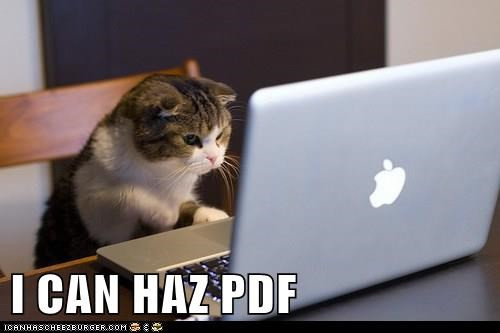I can haz PDF: Academics tweet secret code word to get expensive research papers for free

The beliefs of internet activist Aaron Swartz are clearly still alive and well, as academics around the world are now encouraging online piracy in order to gain access to latest scientific journals without having to pay premium prices.
Academic papers are considered to be copyrighted material just like movies, music, software and TV programmes. The most famous example of academic paper piracy is the case of Aaron Swartz, an internet pioneer in the US who helped develop RSS and co-founded the social bookmarking site Reddit.
Swartz was charged with wire fraud and 11 violations of the Computer Fraud and Abuse Act in 2011 for using an MIT computer to download almost four million academic journals from digital storage library JSTOR with the intent of uploading them for the public to download for free. Federal prosecutors decided to make an example of him, and after having a counter plea bargain rejected, Swartz committed suicide in his New York apartment.
Tweeting a secret code word

Swartz strongly believed that information on the internet should be for free, and it is evident that many people agree with him. According to BBC Trending, scientists are now using a Twitter hashtag called "I can haz PDF" to allow them to swap journal articles for free, in the spirit of the popular I can Haz Cheezburger internet meme website.
Most research papers are published in journals that restrict access to paid subscribers, and institutions tend to pay for access to different journals or libraries of journals, depending on what they need, so there's always a chance that a scientist might need a paper published in a journal that he or she is not subscribed to.
To get around that, scientists take to Twitter and tweet a link to the paper they need together with the hashtag "I can haz PDF" and their email address. Whoever has access to the particular paper downloads it and emails it to the requester, and the tweet is swiftly deleted to remove all evidence of it.
Unfortunately, this practice is definitely illegal as it violates the terms of service of the journal publishers, who feel that research, especially peer-reviewed research, is valuable and should be paid for, and institutions potentially face a great deal of trouble if publishers figure out who is sharing their journal articles for free.
Do content firewalls actually pay?
Since the rise of the 24-hour news cycle and the demise of print journalism, over the last few years several major international daily publications have begun implementing digital paywalls that require users to pay a subscription fee, including stalwarts like the New York Times, The Times, the Wall Street Journal, the Daily Telegraph and the Financial Times.

And now Business Insider has become the first online-only publication to also embrace an online paywall that will restrict some, but not all of its content. But are paywalls actually helping the media to recoup the huge print advertising avenues they used to command?
Not all publications release figures so it's hard to get a broad overview, but despite the large amount of criticism directed at Rupert Murdoch for his decision to put a paywall around The Times, even the Columbia Journalism Review is now admitting that paywalls do seem to be working to convert readers into paid subscribers.
In 2014, it was reported that The Times was earning roughly $60m a year in paywall revenue, but it is not known whether this is equivalent to the digital ad revenue that the publication has lost by changing its revenue model.
© Copyright IBTimes 2025. All rights reserved.






















